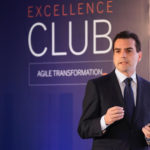BBVA, a leader in working method transformation at Spanish companies
BBVA hosted a meeting of the Excellence Club at the bank’s headquarters in Madrid. Over 60 corporate clients attended the event to discuss the challenges and opportunities posed by the transformation of working methods in organizations.

The bank reached a pioneering milestone, with 33,000 of the group’s central services employees having adopted a new organizational culture marked by a more horizontal structure with multidisciplinary, self-sufficient teams that are capable of adapting to change more rapidly.
This transformation is the result of a process that has been underway for the past five years, positioning BBVA as a leader for other corporations immersed in the challenge of incorporating new work methodologies that thus far were used more by startups or digital players. BBVA organized this event in order to “encourage people to reflect on the future of our organizations, in a context of exponential change where continuous learning and the ability to adapt will be key factors in the success of any human organization,” explained Ricardo Forcano in his opening remarks at the Excellence Club event.
Luisa Gómez Bravo, the Global Head of Corporate and Investment Banking (CIB) hosted all the companies, which are BBVA wholesale banking clients.
“Innovation is part of our daily work with clients. We want to accompany them in the major challenges stemming from digital transformation and the organizational changes that come with it. At the CIB business area, we have also incorporated new working methodologies that facilitate decision-making, greater leadership in teams in their execution, and faster delivery times for solutions for our biggest clients,” said Gómez Bravo during a round table that also included Telefónica and Endesa.
“Being capable of improving response time and offering better service to our clients are clearly necessary advantages in order to compete in the new digital environment,” she added.
“We want to accompany our clients in the major challenges stemming from digital transformation"
The organizational challenges new organizations face are not insignificant and include highly important cultural changes, such as abandoning hierarchies and promoting a new type of leadership. One of the biggest goals BBVA has set for itself is empowering teams to be more autonomous, but also more flexible so that employees are able to change projects or roles in a dynamic manner. This in turn entails another major challenge which is offering continuous training to acquire new skills throughout employees’ career.
Carlos Casas, the Global Head of Talent and Culture at BBVA, underscored some of the biggest changes in terms of talent management: “We have to continue to insist on the cultural transformation, empowering teams and creating an environment of trust so they give their best. It is also critical to build new processes and tools (for example to assign people to projects or evaluate their performance) in order to adapt talent management to the agile reality. Furthermore, we need to continue training people so that we can all learn to work in a different way,” he said.

Carlos Casas, the Global Head of Talent and Culture at BBVA, at the Excellence Club event.
Throughout this meeting of the Excellence Club, the clear advantages of adopting an agile transformation of working methods at organizations were recognized and shared. In addition, those in attendance had the opportunity to reflect on cultural change and the new leadership model with the help of Óscar Méndez, CEO of Stratio and special guest at the event.
The changes in culture, leadership, organization, the talent management model and the governance of the new ways of working are challenges that all large companies face when immersed in this transformation, but the recipes for execution are as diverse as those who attended the event. As they noted during the meeting, the only ingredient they all have in common is their management team’s interest in embarking on the journey toward an ambitious transformation of working methodologies at their organizations. The companies present stressed how valuable this event was for them, as it allowed them to learn from each other.